Self-described “nerd” Caio Borralho quit his chemical engineering studies to become a professional mixed martial arts (MMA) fighter, part of a new generation looking to reinvigorate the sport in Brazil, home of legendary champions.
With his good-natured face and glasses, Borralho, 30, does not fit the stereotype of the scowling, pain-inflicting Brazilian behemoths who have made the country famous as a home of Ultimate Fighting Championship (UFC) icons.
However, he is part of a wave of young Brazilian fighters looking to make their mark and renew the South American country’s dominance, after the retirement of former champions Anderson Silva in 2020 and Amanda Nunes in June, considered by many the greatest of all time.
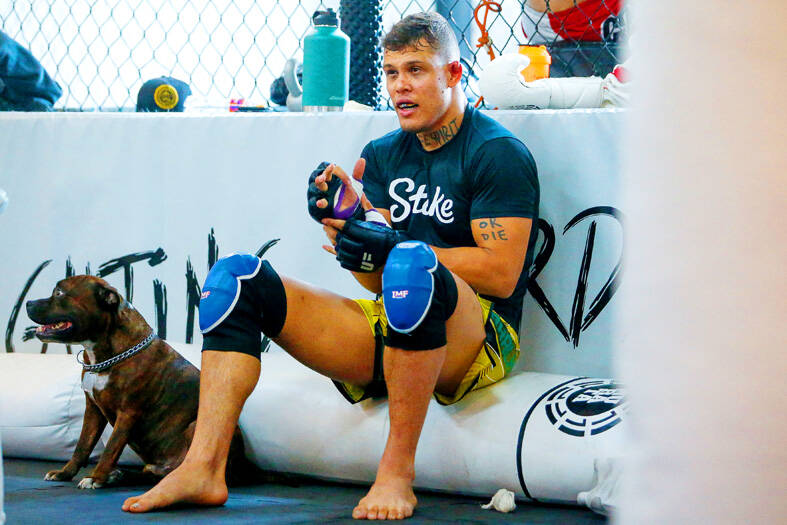
Photo: AFP
Brazil has played a key role in the development of the multimillion-dollar international MMA cage-fighting frenzy, and in launching the UFC, its top competition, in 1993.
Brazilians hold a slew of records in the sport and make up 20 percent of the UFC’s top-ranked fighters across its 13 weight divisions, but the country currently has just one champion: reigning flyweight belt-holder Alexandre Pantoja.
“We’re in a renewal period. There needs to be more investment at the base level,” Borralho said. “There’s been more support in other countries, where the sport has grown really fast. That’s what makes the difference in future results. The secret now is to concentrate on the base level, and we’ll be dominating again in no time.”
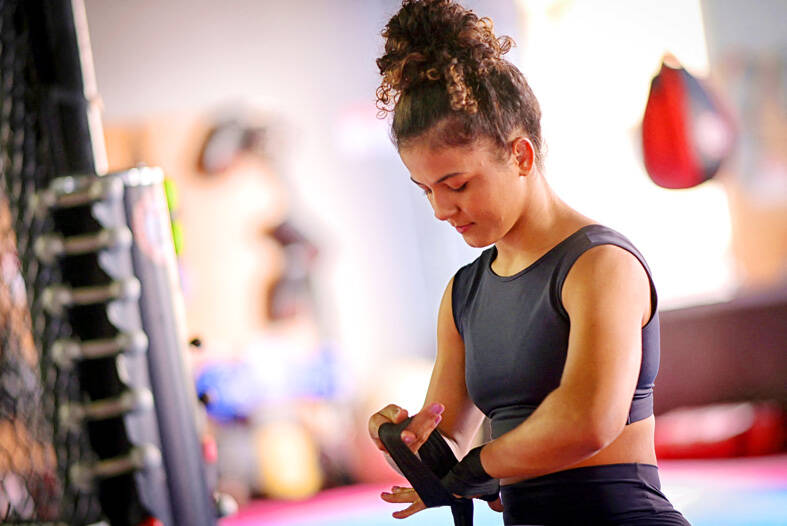
Photo: AFP
Borralho is practicing hand-to-hand combat with about 20 other fighters at a gym in central Sao Paulo, looking to make good on his vow to bring home the UFC middleweight title.
Since making his UFC debut in April last year, he is undefeated in four bouts.
However, he said that he still has work to do.
“I need more fight time, more experience,” said Borralho, who grew up practicing judo in the northeastern city of Sao Luis de Maranhao, took up MMA at 19 and left university a year before graduating to chase his UFC dream.
Other Brazilian fighters such as former champions Charles “Do Bronx” Oliveira and Alex Pereira are also on campaigns to restore the country’s dominance.
Brazil might be the land of soccer, but the country was instrumental in the rise of the UFC, thanks to international interest in Brazilian jiujitsu — a reinvention of the ancient Japanese martial art — and vale tudo, a no-holds-barred combat sport.
“UFC is in Brazilians’ DNA,” said Eduardo Galetti, the UFC’s vice president in Brazil. “Young fighters used to start out in another discipline and discover MMA. Now they’re native-born MMA fighters.”
Brazil has the second-most UFC fighters of any country, and is its second-largest market, after the US, Galetti said.
MMA has become a lucrative business for numerous Brazilian fighters, some of whom have become superstars on the level of Brazil soccer star Neymar.
“I don’t just want to be a champion. I want to be a champion whose story has an impact on other people’s lives. I want to inspire dreams,” 26-year-old fighter Natalia Silva said.
Since making her debut in the octagon in June last year, the flyweight phenom has won all four of her bouts and risen to 13th in the UFC rankings.
“God willing, that belt will be ours very soon,” Natalia Silva said, training at a gym on the outskirts of the southeastern city of Belo Horizonte.
She started out studying taekwondo before discovering the UFC, whose women’s tournaments have grown exponentially since their launch in 2013 — thanks in no small part to Nunes, the trailblazing champion who has held the featherweight and bantamweight belts.
Brazilian women today outrank the men, with 23 of the country’s 42 ranked fighters.
“Brazilians are born with a drive to win. It’s a country where most people have hard lives,” MMA trainer Carlos Junior Lopes said. “The difficulties we face build up our fighting spirit. Combine that with the right technique, and there’s no stopping us.”
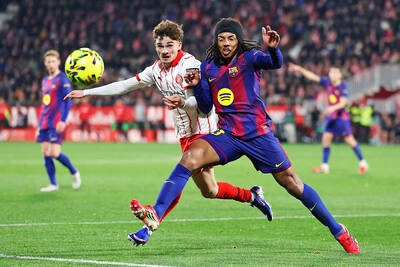
‘EVERYONE SAW’: The visitors were left fuming after Jules Kounde was fouled by Claudio Echeverri in the buildup to the winning goal and it went unpunished Spanish champions Barcelona on Monday fell to a damaging 2-1 defeat at Girona to leave them trailing Real Madrid by two points at the top of La Liga. Los Blancos beat Real Sociedad on Saturday to overtake the Catalans and Hansi Flick’s side could not defeat Girona in an gripping derby clash to reclaim the lead. Teenage star Lamine Yamal missed a penalty for Barcelona, who took the lead through defender Pau Cubarsi just before the hour mark. However, goals from Thomas Lemar and Fran Beltran helped Girona, 12th, mount an impressive comeback. “In the end Girona deserved it, they had a lot of
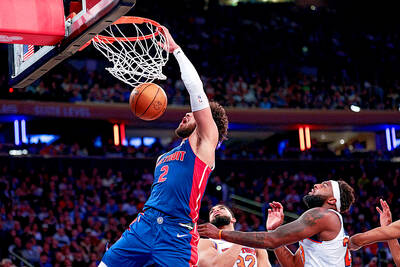
A dominant Cade Cunningham on Thursday scored 42 points as the NBA-leading Detroit Pistons swatted aside the New York Knicks 126-111 on the NBA’s return from its brief All-Star Game break. Billed as a must-watch clash between two Eastern Conference rivals each in red-hot form, the game at Madison Square Garden became an exhibition for Cunningham, who also provided 13 assists and eight rebounds. The 24-year-old burnished his credentials as a Most Valuable Player contender, helping a young, surprise-package Pistons side to improve the best record in the entire NBA this season so far, to 41-13. After the game, Cunningham said that he
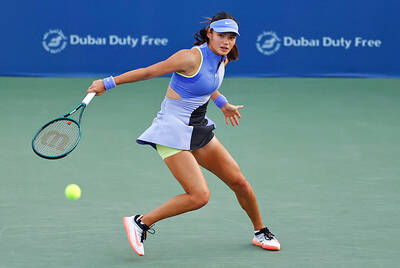
Amanda Anisimova on Monday was handed a walkover into the last 16 of the Dubai Open after her opponent Barbora Krejcikova was forced to withdraw from the WTA 1000 event. The American second seed enters the round-of-16 against Janice Tjen without swinging a racket as two-time Grand Slam winner Krejcikova pulled out due to an issue with her left thigh. They became the seventh and eighth players to pull out, a list that includes the world top two Aryna Sabalenka and Iga Swiatek. Tjen booked her meeting with Anisimova thanks to a 7-6 (7/5), 6-4 win in her round-of-32 match against 2021 US
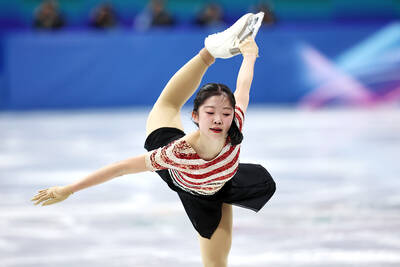
MEN’s FREESKI BIG AIR: Norway’s Tormod Frostad found an extra gear under the most intense pressure to post a winning total of 195.50 to top the podium Japanese teenager Ami Nakai on Tuesday set the pace in the Olympic women’s figure skating competition as freestyle skier Tormod Frostad soared to gold in an all-time classic big air final. Nikai, 17, upstaged teammate Kaori Sakamoto at the Milano Ice Skating Arena, while Alysa Liu of the US rounded out a powerful top three after the short program. Sakamoto is searching for an elusive gold at her final Winter Games, but faces a stiff challenge from a new generation of Japanese stars including Nakai and Mone Chiba. The 25-year-old Sakamoto, a relative veteran in the sport, won both of her segments in